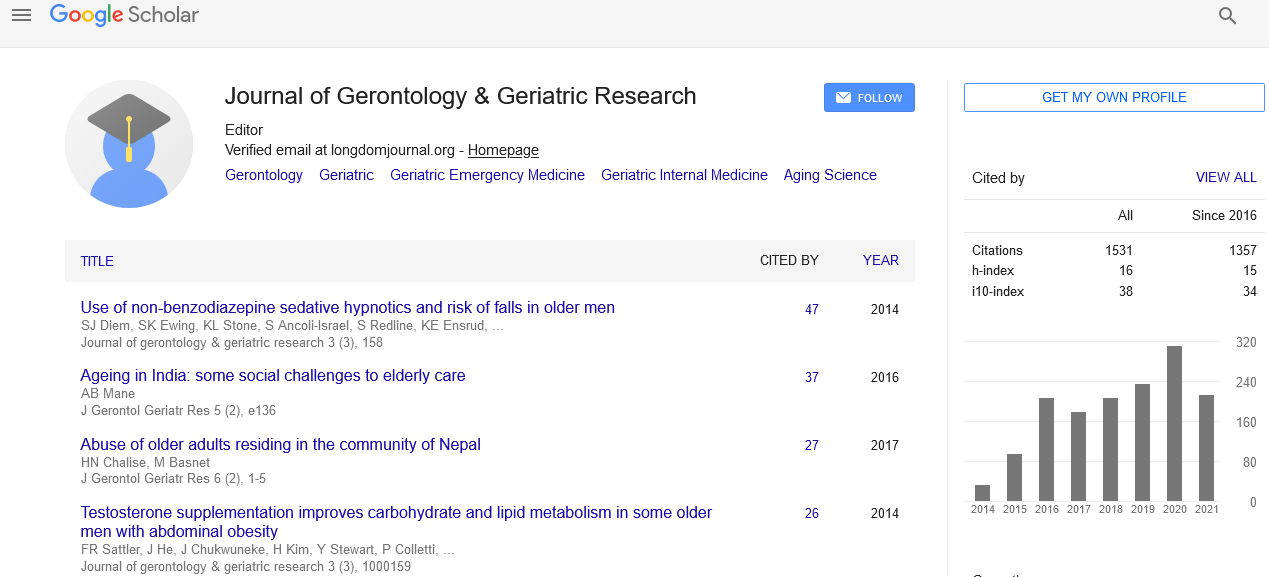PMC/PubMed Indexed Articles
Indexed In
- Open J Gate
- Genamics JournalSeek
- SafetyLit
- RefSeek
- Hamdard University
- EBSCO A-Z
- OCLC- WorldCat
- Publons
- Geneva Foundation for Medical Education and Research
- Euro Pub
- Google Scholar
Useful Links
Share This Page
Journal Flyer

Open Access Journals
- Agri and Aquaculture
- Biochemistry
- Bioinformatics & Systems Biology
- Business & Management
- Chemistry
- Clinical Sciences
- Engineering
- Food & Nutrition
- General Science
- Genetics & Molecular Biology
- Immunology & Microbiology
- Medical Sciences
- Neuroscience & Psychology
- Nursing & Health Care
- Pharmaceutical Sciences
WORKING MEMORY BRAIN TRAININGS FOR OLDER ADULTS: HOW THEY WORK AND DO THEY WORK?
2nd International Conference on Aging & Gerontology
June 26-27, 2017 San Diego, CA, USA
Olga Alicja Matysiak
University of Social Sciences and Humanities, Poland
Scientific Tracks Abstracts: J Gerontol Geriatr Res
Abstract:
Statement of the Problem: Aging, even in the absence of pathological conditions, is associated with cognitive decline. Executive functions and memory seem to be most affected. Deterioration is related to structural and connectivity changes in the brain and observed mostly in prefrontal cortex, hippocampus, and basal ganglia. To remediate age-related deficits cognitive training programs have been developed. The prosperous branch of computer-based training also serves this purpose. Some of these interventions show a great potential for improving older adults�?? cognition. Others infrequently generalize to tasks that were not specifically trained. Of particular interest are working memory (WM) interventions. Although working memory capacity has conventionally been conceptualized as a fixed trait, there is evidence that WMC can be augmented even in older age. These statements are reflected in recent neuroimaging studies focused on integrating cognitive plasticity with its neural mechanisms. In intervention research on WM, practice has been associated with both decreases and increases of brain activity in task-relevant brain regions. Methodology & Theoretical Orientation: In the present study we attempted to verify the effectiveness of a 5-week-long WM training using dual version of the N-back Task. Six tests (e.g. Sternberg Task, OSPAN, Syllogisms Task) served as cognitive assessment at baseline and post training sessions. Two tests were additionally accompanied by EEG recording. Findings: Data analysis provided moderate support for the efficacy of our intervention in healthy elders. We discuss this result, among others, in terms of too high complexity and requirements of a training task. We also looked for changes in electrophysiological activation patterns during the EEG recording. Our analysis reveals that, irrespective of the absence of vivid behavioral intervention�??s effects, there are changes in psychophysiological mechanisms that underlie cognitive performance. We conclude that, although electroencephalographic data has provided us with information about the mechanisms of WM training to a certain extent, more research is needed to understand its neural impact.
Biography :
Olga Matysiak has graduated with a Master Degree in Cognitive Neuroscience with the highest distinction from the University of Social Sciences and Humanities in Poland. Now she is continuing her education as the PhD Student in Laboratory of Psychophysiological Experiments at the same University. Since the early beginnings of her scientific career ,she was involved in the neuro-cognitive projects focused on exploring and enhancing mental functioning, especially among older adults. Currently, with the usage of the latest EEG signal processing methods, she is analysing the benefits of working memory cognitive trainings designed for elders.
Email: omatysiak@st.swps.edu.pl


